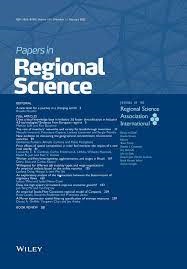PAPERS IN REGIONAL SCIENCE
Número:
4
Publicado:
Clasificación JEL:
C25, F14, R10

Lo más reciente
Rocío Clara Alexandra Mora-Quiñones, Antonio José Orozco-Gallo, Dora Alicia Mora-Pérez
Leonardo Fabio Morales, Leonardo Bonilla-Mejía, Didier Hermida-Giraldo, Francisco Javier Lasso-Valderrama, José Pulido
Constanza Martínez-Ventura, Ligia Alba Melo-Becerra
We investigate the effect of domestic armed violence brought about by insecurity on the geography of freight mobility and the resulting differential access of regions to global markets. There is a preponderance of evidence from the micro-level analysis of Colombia-U.S. export shipping records that export freight shipping from inland regions was re-routed to avoid exposure to domestic armed violence despite extended landside and maritime shipping distances. The discrete choice model shows that the shipping flow was curbed by the extended re- routing due to localized domestic armed violence. The results highlight that security must be accommodated for sustained freight mobility and export-oriented economic development in the Global South.
